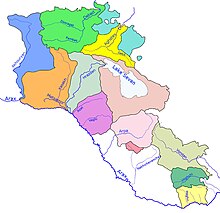Akhurian River
| Akhurian | |
|---|---|

|
|

Akurian river and its basin (blue) within Armenia
|
|
| Native name | Ախուրյան Arpaçay Ахурян |
| Country | Turkey |
| Basin features | |
| Main source |
Lake Arpi, Shirak, Armenia 2,023 m (6,637 ft) |
| River mouth | Near Bagaran, Armenia |
| Physical characteristics | |
| Length | 186 km (116 mi) |
The Akhurian, Akhuriyan, Akhuryan or Akhouryan (Armenian: Axuryan; Classical Armenian: Axurean; Turkish: Arpaçay; Russian: Арпачай or Ахурян) is a river in the South Caucasus. It originates in Armenia and flows from Lake Arpi, along the closed border with Turkey, forming part of the geographic border between the two states, until it flows into the Aras River as a left tributary near Bagaran. The Akhurian drains an area of about 9,500 square kilometres (3,700 sq mi) and has total length of 186 kilometres (116 mi).
Gyumri, the second largest city of Armenia, is located on the east bank of the river, which also flows past four of the twelve historical capitals of Armenia: Ani, Bagaran, Yervandashat and Yerazgavors.
When the Byzantine army arrived in the province of Shirak in 1041, local Armenian nobles (nakharars) assembled together against them under the command of the Pahlavuni general Vahram Pahlavouni. Vahram then selected a body of 30,000 infantry and 20,000 cavalry, forming three divisions, which fought against the Byzantines. A battle ensued in which the invaders were routed with great slaughter. The fight was so ferocious that the effusion of blood flowing into the Akhurian River is said to have coloured its waters completely red. The Byzantines left 21,000 dead behind. This victory allowed Vahram Pahlavuni along with Catholicos Petros Guedadarts to crown Gagik II king of Armenia and subsequently take the fortress of Ani, which had been in the hands of Vest Sarkis.
...
Wikipedia
